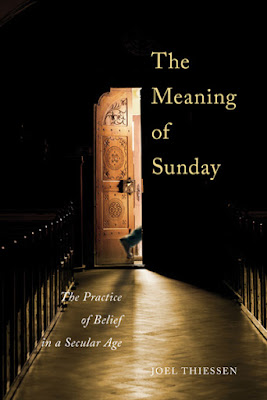I was at The Forks in
Winnipeg one summer Sunday morning, enjoying brunch with out-of-town friends.
Normally, we would have
been in church. But it was the only time they could meet.
As I ate, I watched all
the people in the park enjoying not being at church—there were families and
couples, old and young, all enjoying time outdoors and with each other.
What on earth, I
wondered, could ever make them want to give that up to sit inside a church on
such a glorious day and hear a sermon?
As it turns out, I wasn’t
the only one wondering that. That same question crossed Joel Thiessen’s mind.
The difference is, he decided to find out.
The result is his new
book The Meaning of Sunday: The Practice of Belief in a Secular Age.
The book is based on
interviews the sociology professor at Calgary’s Ambrose University conducted
with people who don’t go to church. He wanted to know: Why not?
They gave him eight main
reasons.
At the top of the list was the feeling that the church is too exclusive in its beliefs and practices—that it is out of step with a Canadian values of inclusivity and tolerance.
At the top of the list was the feeling that the church is too exclusive in its beliefs and practices—that it is out of step with a Canadian values of inclusivity and tolerance.
This would especially be
true of things like not allowing women to be leaders, or not accepting or
affirming people who are gay.
Next was life transitions; people today move a lot, and find it hard to put down roots in a church.
Teenage choice was third. Parents today increasingly let their teenage children decide whether they want to go to church or not. When that happens, Thiessen says, “most teens opt out at that point.”
Busyness was fourth. Most families have two working parents today, and their kids are involved in multiple extracurricular activities. They barely have time to do laundry and buy groceries. Who has time to go to church?
Sex scandals came in fifth, along with religiously-inspired violence.
Sixth on the list was the inability to reconcile religious beliefs with science, or with evil in the world.
A bad experience in a church was seventh. This can be anything from not feeling welcome in a church, to not feeling cared for.
Last on the list was social ties: If friends and family frown upon involvement in a religious group, chances are people will stop going.
Next was life transitions; people today move a lot, and find it hard to put down roots in a church.
Teenage choice was third. Parents today increasingly let their teenage children decide whether they want to go to church or not. When that happens, Thiessen says, “most teens opt out at that point.”
Busyness was fourth. Most families have two working parents today, and their kids are involved in multiple extracurricular activities. They barely have time to do laundry and buy groceries. Who has time to go to church?
Sex scandals came in fifth, along with religiously-inspired violence.
Sixth on the list was the inability to reconcile religious beliefs with science, or with evil in the world.
A bad experience in a church was seventh. This can be anything from not feeling welcome in a church, to not feeling cared for.
Last on the list was social ties: If friends and family frown upon involvement in a religious group, chances are people will stop going.
Faced with a list like
this, the traditional response of church leaders is to try to fix the things it
can that prevent people from going to
church—be more friendly, have more intellectually-rigorous sermons, be more
accepting.
But even if churches did
that, it wouldn't make much difference, Thiessen says.
“Demand for greater
involvement is not strong” in Canada, he says, noting that the church can’t fix
things like busyness or how mobile people are today.
The fact is that “most
of those who are not regularly involved are fairly content with their levels of
involvement,” says Thiessen. “Any lip service paid to desiring greater
involvement is just that—lip service.”
The central premise of his new book is that Canada is “becoming increasingly secular, and there’s no reason to believe these trends won’t continue . . . simply put, fewer Canadians identify with a religious tradition, or desire to attend worship services regularly.”
The central premise of his new book is that Canada is “becoming increasingly secular, and there’s no reason to believe these trends won’t continue . . . simply put, fewer Canadians identify with a religious tradition, or desire to attend worship services regularly.”
That certainly seemed to
be the case for the people I saw at The Forks that fine summer Sunday morning.


